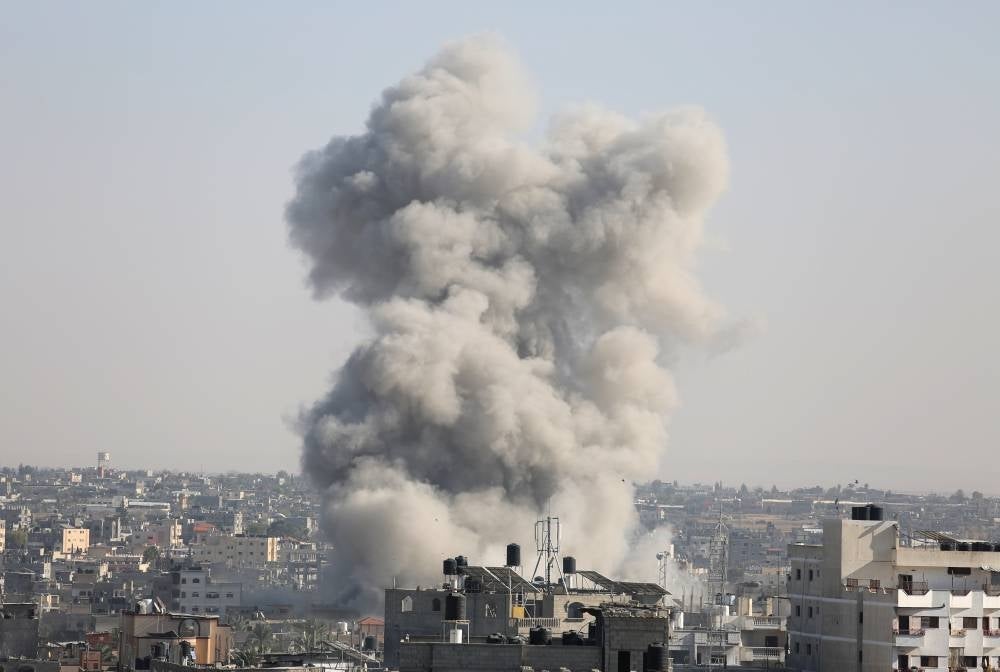The Palestinian Diaries: 'Israel knows they're fighting the wrong war'

SHAH ALAM - In a scathing critique of Israel's actions and internal strife, the recognition that they are fighting the wrong war has come to the fore.
This was revealed by Asia Middle East Centre for Research and Dialogue (AMEC) director Dr Muslim Imran during Sinar Daily's "The Palestinian Diaries" podcast.
He said that Israel projected itself as a formidable tiger, but now it was evident to many that it was more of a paper tiger.
“Despite their technological prowess, Israel is increasingly aware that they are in the wrong, occupying other people's land and enforcing policies that are viewed as apartheid.
"Moreover, a significant number of Israeli soldiers, particularly young cadets, openly express their frustration, often directing their discontent towards Israeli Prime Minister Benjamin Netanyahu when he visits their military sites.
“This sentiment reflects a broader understanding among many that they are engaged in a misguided war," he said.
Muslim questioned the justification for Israel to pursue children through the streets of the West Bank and subject them to violence.
He also questioned the prolonged siege on the Gaza Strip, which resulted in a dire and unimaginable existence for its densely populated Palestinian residents.
In Gaza, he noted that a staggering 2.3 million Palestinians found themselves residing in what was frequently described as the world's largest open-air prison.
While acknowledging that human failures and political challenges exist within Israeli society, he emphasised the deep fragment between the establishment and certain right-wing political factions, which had become increasingly apparent through ongoing protests and a judicial crisis.
"We have witnessed their judicial crisis over the last few months as they engaged in protests. Even the people rose against the ministers, engaging in arguments and sharing videos on social media.
“It is ironic that some in the West frame the crisis as a struggle for democracy. Israel was never a democracy in the first place," he said.
He further added that Israel had historically operated as a democracy exclusively for the Jewish population, leaving millions of Palestinians under their authority, whether as citizens or military occupation subjects, excluded from full participation in this democratic system.
Consequently, he said that Israeli society grappled with a series of crises, encompassing judicial, political, religious, and other disputes. These ongoing conflicts had significantly impeded their ability to respond effectively.
Regrettably, he said that their military response had been criticised as ineffective, with a noticeable absence of a well-defined military strategy.
"What they are doing in Gaza now can only be described as madness.
"They are not responding to a military attack; instead, they are destroying homes, mosques, commercial buildings, shopping malls, and places of worship, inflicting terror on innocent civilians," he stressed.
He argued that if Israel were genuinely committed to countering the military attacks of the Qassam Fighters, they should engage in direct combat on the battlefield instead of bombing civilian areas.
"However, they are not doing so, and instead, they are bombarding mosques and hospitals.
"In fact, they have even targeted ambulances, resulting in the deaths of many paramedics and journalists in southern Lebanon as the situation escalated.
“Even in Lebanon, they killed an Al-Jazeera correspondent in the border area, despite the global awareness of journalists' presence in such locations," he elaborated.
He further said that these actions could be perceived as desperate, last-ditch efforts aimed at preserving Israel's image and reputation.
Despite Israel's significant technological and military capabilities, a relatively small number of Palestinian Freedom Fighters, possibly just a few hundred, managed to deliver a significant blow to their southern command on the battlefield.
"This development has given rise to a wave of Western propaganda attempting to shape the narrative."










